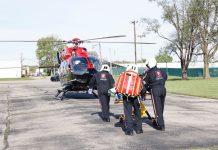One sounds like a small number, but to Columbus’ economic development officials it’s big.
One is the target number of new company attractions the Greater Columbus Economic Development Corp. sets each year, said Jason Hester, its president.
When Japan-based Daiei Giken Kogyo Co. Ltd. announced in 2015 that it would invest $3 million to establish a wholly owned subsidiary, Daiei Inc., in Columbus with five employees initially, that was a win, Hester said.
So was the announcement in 2016 that Flint, Michigan-based Shively Brothers, a precision-tooling preset company, planned to invest $725,000 in new equipment to set up operations in the city and hire nine employees initially.
[sc:text-divider text-divider-title=”Story continues below gallery” ]
“We call it a win because we’re competing for them with other states,” Hester said.
Expansion in Columbus by existing companies comes far more frequently. More than 70 business expansions, representing more than $500 million in capital investment, have occurred in the past six years, Hester said.
Both Daiei and Shively Brothers are in the advanced manufacturing industry, which dominates the jobs and wages in Bartholomew County. Advanced manufacturing accounts for 39.1 percent of the county’s jobs and 48.5 percent of its wages, according to county data from StatsAmerica.
Even with advanced manufacturing’s dominance in Bartholomew County, a shortage exists locally in the number of people to fill jobs in this industry sector, defined as the use of innovative technologies to create existing products and new ones.
The shortage is a problem local education and business leaders are working together to fix.
Despite the competitive local manufacturing marketplace and workforce challenges — including an unemployment rates so low it essentially means the county is at full employment — new companies find reasons to be attracted to Columbus and setting up shop in the city.
One more example is The Phoenix Group, a supply chain management company, which in 2012 announced plans to construct a $15 million manufacturing and assembly plant and create at least 50 jobs in Columbus.
Good place for business
Columbus appealed to Daiei for several reasons. A good mix of industrial and manufacturing companies locally creates a good pool of resources for Daiei Inc.’s needs, senior vice president James Kaparakis said.Its manufacturing plant at 810 Depot St. is about an 11-minute drive from Toyota Industrial Equipment Manufacturing (TIEM), its sole customer currently, for which it makes rear pillars for forklifts.
“It’s extremely convenient for us,” Kaparakis said.
Toyota has been a customer of Daiei’s parent company for more than 25 years. Setting up shop in Columbus near TIEM also aligned with the parent company’s risk assessment that all of its operations should not be based in Japan. That’s because the island nation is susceptible to natural disasters, Kaparakis said.
Renovations at the 7,040-square-foot Depot Street facility started in the fall of 2015 and were completed by January 2016, Kaparakis said. From then until August, he focused on hiring and training employees, and testing the pillars they made to ensure they met TIEM’s quality standards. The first shipments to TIEM began in September, he said.
Although the skills gap has been a challenge for advanced manufacturing employers locally, Kaparakis said he didn’t have trouble hiring workers. The experience they had in the field was helpful.
“They were very easy to teach and willing to learn and be flexible. We all have to wear multiple hats,” Kaparakis said.
Kaparakis said one hiring strategy he had was to offer a slightly higher starting hourly wage and full benefits after just 30 days. The company’s starting wage currently is $13.75 an hour, the equivalent of $28,600 per year, he said.
Hester said he advises prospective manufacturing companies looking to come to Columbus that they will need to offer competitive wages and/or benefits in order to attract workers.
Daiei’s 6:30 a.m. to 3 p.m. production schedule also is attractive to employees, Kaparakis said.
The company has seven employees — five of which are on the shop floor — and plans to add one this week and another in May, Kaparakis said.
Employees are making about 100 sets of rear pillars — both a left and right — daily. The plant has the capacity to make 140 sets each work day.
“Our production is creeping up every month,” Kaparakis said.
He said the company’s incremental growth and increasing efficiency is pleasing.
Daiei also will soon begin making a second model of rear pillar for TIEM, one that is larger and for a more unique type of forklift, and will be made in small quantities initially, Kaparakis said.
The company’s long-term goal, Kaparakis said, is to add more customers and make more types of products, just like its parent company does — such as brake pedals and clutches.
Working hard for investment
Attracting companies that start small in Columbus is just fine with Hester.He noted that two of Bartholomew County’s top employers, NTN Driveshaft (about 1,900 employees) and TIEM (about 1,400 employees), started relatively small at about 200 employees.
“We’re not hunting whales. We’re investing big in the right types of businesses that can help the economy and community,” Hester said.
Competition for new business investment has intensified over decades, especially with the rise of the Internet, which makes data acquisition on communities easier. The times in the 1980s when Columbus would announce three or four new business investments annually — primarily from Japan and other foreign countries — are an outdated benchmark, he said.
Word of mouth helped sell communities, and the seeds planted by former Mayor Bob Stewart and local economic development officials with economic missions trips to Asia and Europe gave Columbus an advantage then, Hester said.
During Stewart’s three terms in office, from 1984 to 1995, Columbus attracted 28 international companies to establish operations in the city and the community’s workforce had grown by more than 10,000.
Today, the city has to work hard to attract just one new company per year, said Hester, whose schedule demonstrates that.
He spent three days last week in Tucson, Arizona, for the Site Selectors Guild conference. Site selectors help companies explore potential sites for investment, and incentives available. Hester is there to make contact with as many site selectors as possible to pitch Columbus.
“We’re sowing seeds,” he said.
Hester said he will attend an event this week that focuses on the pharmaceutical industry, where the Columbus’ economic development office will be the only one in attendance. Columbus, in an effort to diversity its industrial base so it’s not as reliant on automotive-related manufacturing, has identified the pharmaceutical industry as a target.
Hester will travel to Europe in June for the Paris Air Show in France, and then the Engine Expo in Stuttgart, Germany.
The Paris Air Show is the largest aerospace event in the world. Hester said the city hopes to attract aerospace manufacturing companies because it would help industry diversification, and skills used in automotive manufacturing transfer well to this industry.
At the Engine Expo in Germany, Columbus is looking to attract research-and-development companies. When the Engine Expo moves to Detroit in the fall, Columbus will have an exhibitor’s booth, which will help him tell the city’s story to companies.
Hester also will attend two or three other site-selector events, where Columbus will be a sponsor and have one-on-one meetings with site selectors.
Sponsorship at site selectors events, the ability to exhibit at the Engine Expo and attendance at more trade shows is possible because of a greater financial commitment by city government in the Greater Columbus Economic Development Corp., Hester said.
In March 2016, Mayor Jim Lienhoop agreed to pay an extra $136,000 in annual dues for three years to the Greater Columbus Economic Development Corp. to ramp up economic development work. The economic development office had been receiving $14,000 per year from the city.
Creating optimal workforce
While Hester works to attract new manufacturers to Columbus and help existing companies grow and expand operations, others in the city and region work to create conditions attractive to new and existing employers through initiatives to retain and train talent.One way that is done is the Manufacturing Educator Partnership, which brings together manufacturing leaders, local educators and workforce and community-based organizations to coordinate and align educational programs and training so that students can follow a pathway to well-paying, in-demand manufacturing jobs.
Caltherm Corp., Cummins Inc., Dorel Juvenile Group, Faurecia, NTN Driveshaft and Toyota are advanced manufacturing companies in the city that are among the MEP stakeholders.
Prospective new companies are unlikely to find in other communities where a forum is as focused as Columbus on creating effective pathways to careers in advanced manufacturing, said Kathy Oren, executive director of the Community Education Coalition.
Manufacturers also play a role in engaging educators to assist in the pathway building.
For example, NTN Driveshaft will host an event April 6 with employers from Bartholomew, Decatur and Jackson counties, and counselors and principals from area middle and high schools to discuss in-demand jobs and the courses students need to take to have the skill sets to fill manufacturing jobs, said Stephanie Weber, the EcO regional director for the Manufacturing Network.
A few times a year, prospective companies that Hester is working with will seek information related to education and the workforce that will require their response, Weber and Oren said.
They said the questions usually are about:
Education programs that are available
Number of students graduating with certain desired degrees
How many students are enrolled in specific courses
Overall student attainment
Graduation rates
Numbers of students placed in specific jobs
“If I were a new company, I think it would be refreshing to know that, yes, you’ve got your (human resources) department and recruiters, but you’ve also got people there in the community that are helping you connect in with your most valuable workforce pool to recruit from,” Weber said.
[sc:pullout-title pullout-title=”About Daiei” ][sc:pullout-text-begin]
Who: Daiei Inc.
What: Wholly owned subsidiary of Japanese company Daiei Giken Kogyo Co. Ltd.
Location: Manufacturing facility at 810 Depot St., Columbus; business office at 3620 Commerce Drive, Columbus.
Product: Rear pillars for forklifts for Columbus-based Toyota Industrial Equipment Manufacturing
Employees: 7, with plans to add 2 more by May
[sc:pullout-text-end][sc:pullout-title pullout-title=”Pull Quote” ][sc:pullout-text-begin]
“We’re not hunting whales. We’re investing big in the right types of businesses that can help the economy and community.”
— Jason Hester, Greater Columbus Economic Development Corp. president
[sc:pullout-text-end]




